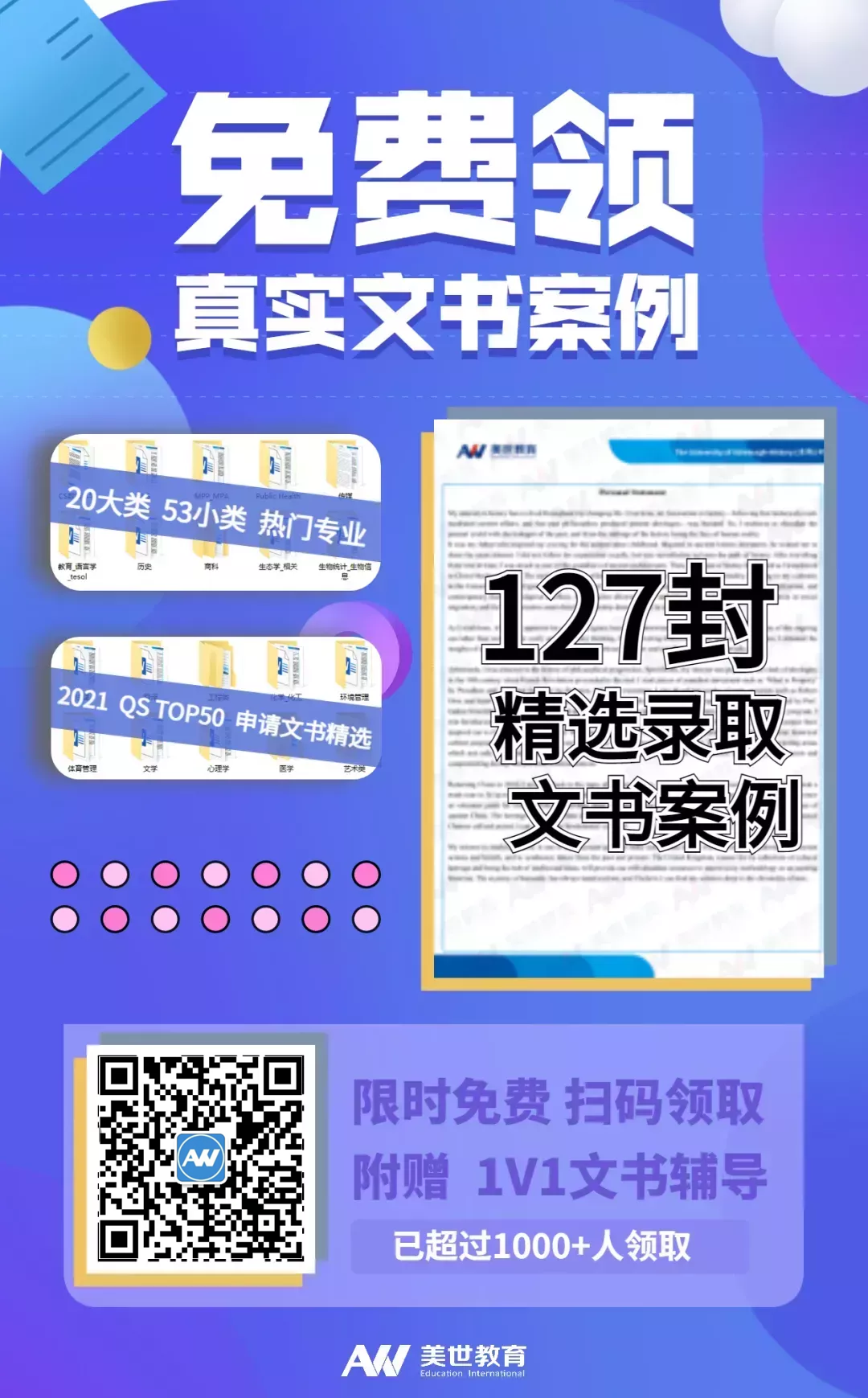67
在美本申请中,文书是绕不过的一道坎,它仿佛是一场文字版的面试。
精彩的文书不仅能让招生官更好地评估学生的英语表达能力,还可以让招生官有效地了解学生的综合实力,为申请增添竞争力。
随着申请季的日益临近,同学们准备得怎么样了呢?诚然,文书也是很多同学最为头疼的环节:没有思路,不知道从何处入手;文章缺乏亮点,无法展现自己的个性与长处;创作遇到瓶颈,不知道如何去克服。
超过75%的大学都会对申请文书给予一定程度的重视。并且越挑剔的大学,文书分量越大。除了Common App上要求的主文书要求外,很多美国大学还需要学生递交额外的补充文书。今天,美世酱带大家看看美国藤校已公布的22-23申请季的补充文书题目都有哪些吧!
藤校发布最新文书申请要求
虽然普林斯顿大学还未公布2022-2023年的补充文书题目,但该校非常看重学生的英语学术写作能力。因为除了补充文书的要求,普林斯顿大学都会有一个Graded Written Paper。
今年布朗大学给2022-23年的新生和转学生们,一共布置了3道补充文书:
1.Brown’s Open Curriculum allows students to explore broadly while also diving deeply into their academic pursuits. Tell us about any academic interests that excite you, and how you might use the Open Curriculum to pursue them while also embracing topics with which you are unfamiliar. (200-250 words)
2.Brown’s culture fosters a community in which students challenge the ideas of others and have their ideas challenged in return, promoting a deeper and clearer understanding of the complex issues confronting society. This active engagement in dialogue is as present outside the classroom as it is in academic spaces. Tell us about a time you were challenged by a perspective that differed from your own. How did you respond? (200-250 words)
3.Brown students care deeply about their work and the world around them. Students find contentment, satisfaction, and meaning in daily interactions and major discoveries. Whether big or small, mundane or spectacular, tell us about something that brings you joy. (200-250 words)
相比去年,达特茅斯学院今年除了补充文书题目内容改变了以外,还比去年多了一道题。
达特茅斯学院要求申请人对以下三篇附加文书题目写简短的回答:
此外,耶鲁大学、康奈尔大学也公布了最新补充文书的要求细则,对于自己目标院校的补充文书有任何需要专业帮助的同学,都可以扫码添加美世酱寻求美世老师的帮助。

从上面藤校的文书题目要求我们可以感受出,看似不相关的问题,实际上都是相辅相成的。美国大学不仅是通过一篇文书来深入了解你的背景,更多也是在考察学生的英文写作水平、批判性思维能力、思考力等。
新一年申请季,
文书该如何破题?
每年,都会有同学凭借一封出彩的文书,逆袭进入顶尖梦校。但高质量的申请文书应该怎么写?什么样的文书才能打动招生官的出彩文书?如何通过撰写文书,展示自己的特质?怎么写才叫“不落俗套”?
好的文书应该是简洁、真实、有意义的,可以将申请生与同龄人区分开来,紧扣题眼是主文书写作的必要法则,可总有些学生写着写着就跑题了。这时候找准切入点就非常有必要!比如在写学业成绩或专业奖项时,学生要考虑到是否与其他的申请材料重复。优秀的文书应该包含在申请中其他任何地方都没有的信息,如果只是一而再,再而三的重复,难免会给招生官留下不好的印象。
无一例外地,大学想在文书中看到学生的潜力,看到他们有逻辑地叙述自己的过往经历。这些叙述应该使用具体的细节和例子,甚至是从现有的经历出发,去联系到本没有想到的事情,延伸故事内涵,思考这件事对于自己成长的独特意义。
当然,为了找到合适的切入点,申请生还可以阅读往年的成功申请文书来集思广益,或者让家长/同龄人来评价自己的长处、特质,看一看别人眼中的自己。美世酱在这里帮大家整理了127封文书写作成功案例,现在扫码免费领取,让你有足够的时间和精力打磨你的文书。

《纽约时报》最佳文书示例
为了让大家对文书创作有更清晰的认知,最后美世酱也分享下今年纽约时报刊登的思想和故事俱佳的优秀文书示例。
今年的5篇优秀文书已经陆续公布,因为篇幅原因,今天的文章里只给大家放两篇。

Adrienne Coleman,教友会学校, 纽约长岛
N.Y. — Friends Academy
My mom finds a baffling delight from drinking from glass, hotel-grade water dispensers. Even when three-day-old lemon rinds float in stale water, drinking from the dispenser remains luxurious. Last year for her birthday, I saved enough to buy a water dispenser for our kitchen counter.
However, instead of water, I filled it with handwritten notes encouraging her to chase her dreams of a career.
As I grew older, I noticed that my mom yearned to pursue her passions and to make her own money. She spent years as a stay-at-home mom and limited our household chores as much as she could, taking the burden upon herself so that my brothers and I could focus on our education.
However, I could tell from her curiosity of and attitudes toward working women that she envied their financial freedom and the self-esteem that must come with it. When I asked her about working again, she would tell me to focus on achieving the American dream that I knew she had once dreamed for herself.
For years, I watched her effortlessly light up conversations with both strangers and family. Her empathy and ability to understand the needs, wants and struggles of a diverse group of people empowered her to reach the hearts of every person at a dinner table, even when the story itself did not apply to them at all.
She could make anyone laugh, and I wanted her to be paid for it. “Mom, have you ever thought about being a stand-up comedian?”
She laughed at the idea, but then she started wondering aloud about what she would joke about and how comedy shows were booked. As she began dreaming of a comedy career, the reality of her current life as a stay-at-home mom sank in. She began to cry and told me it was too late for her. I could not bear to watch her struggle between ambition and doubt.
Her birthday was coming up. Although I had already bought her a present, I realized what I actually wanted to give her was the strength to finally put herself first and to take a chance.
I placed little notes of encouragement inside the water dispenser. I asked my family and her closest friends to do the same. These friends told her other friends, and eventually I had grown a network of supporters who emailed me their admiration for my mom.
From these emails, I hand wrote 146 notes, crediting all of these supporters that also believed in my mom. Some provided me with sentences, others with five-paragraph-long essays. Yet, each note was an iteration of the same sentiment: “You are hilarious, full of life, and ready to take on the stage.”
On the day of her birthday, my mom unwrapped my oddly shaped present and saw the water dispenser I bought her. She was not surprised, as she had hinted at it for many years.
But then as she kept unwrapping, she saw that inside the dispenser there were these little notes that filled the whole thing. As she kept picking out and reading the notes, I could tell she was starting to believe what they said. She started to weep with her hands full of notes. She could not believe the support was real, that everyone knew she had a special gift and believed in her.
Within two months, my mom performed her first set in a New York comedy club. Within a year, my mom booked a monthly headlining show at the nation’s premier comedy club.
I am not sure what happened to the water dispenser. But I have read the notes with my mom countless times. They are framed and line the walls of her new office space that she rented with the profits she made from working as a professional comedian. For many parents, their children’s careers are their greatest accomplishment, but for me my mom’s is mine.
Hoseong Nam,英国越南国际学校,越南河内
Hanoi, Vietnam — British Vietnamese International School
Despite the loud busking music, arcade lights and swarms of people, it was hard to be distracted from the corner street stall serving steaming cupfuls of tteokbokki — a medley of rice cake and fish cake covered in a concoction of hot sweet sauce.
I gulped when I felt my friend tugging on the sleeve of my jacket, anticipating that he wanted to try it. After all, I promised to treat him out if he visited me in Korea over winter break.
The cups of tteokbokki, garnished with sesame leaves and tempura, was a high-end variant of the street food, nothing like the kind from my childhood. Its price of 3,500 Korean won was also nothing like I recalled, either, simply charged more for being sold on a busy street.
If I denied the purchase, I could console my friend and brother by purchasing more substantial meals elsewhere. Or we could spend on overpriced food now to indulge in the immediate gratification of a convenient but ephemeral snack.
At every seemingly inconsequential expenditure, I weigh the pros and cons of possible purchases as if I held my entire fate in my hands.
To be generously hospitable, but recklessly drain the travel allowance we needed to stretch across two weeks? Or to be budgetarily shrewd, but possibly risk being classified as stingy? That is the question, and a calculus I so dearly detest.
Unable to secure subsequent employment and saddled by alimony complications, there was no room in my dad’s household to be embarrassed by austerity or scraping for crumbs.
Ever since I was taught to dilute shampoo with water, I’ve revised my formula to reduce irritation to the eye. Every visit to a fast-food chain included asking for a sheet of discount coupons — the parameters of all future menu choice — and a past receipt containing the code of a completed survey to redeem for a free cheeseburger.
Exploiting combinations of multiple promotions to maximize savings at such establishments felt as thrilling as cracking war cryptography, critical for minimizing cash casualties.
However, while disciplined restriction of expenses may be virtuous in private, at outings, even those amongst friends, spending less — when it comes to status — paradoxically costs more. In Asian family-style eating customs, a dish ordered is typically available to everyone, and the total bill, regardless of what you did or did not consume, is divided evenly.
Too ashamed to ask for myself to be excluded from paying for dishes I did not order or partake in, I’ve opted out of invitations to meals altogether. I am wary even of meals where the inviting host has offered to treat everyone, fearful that if I only attended “free meals” I would be pinned as a parasite.
Although I can now conduct t-tests to extract correlations between multiple variables, calculate marginal propensities to import and assess whether a developing country elsewhere in the world is at risk of becoming stuck in the middle-income trap, my day-to-day decisions still revolve around elementary arithmetic.
I feel haunted, cursed by the compulsion to diligently subtract pennies from purchases hoping it will eventually pile up into a mere dollar, as if the slightest misjudgment in a single buy would tip my family’s balance sheet into irrecoverable poverty.
Will I ever stop stressing over overspending?
I’m not sure I ever will.
But I do know this. As I handed over 7,000 won in exchange for two cups of tteokbokki to share amongst the three of us — my friend, my brother and myself — I am reminded that even if we are not swimming in splendor, we can still uphold our dignity through the generosity of sharing.
Restricting one’s conscience only around ruminating which roads will lead to riches risks blindness toward rarer wealth: friends and family who do not measure one’s worth based on their net worth. Maybe one day, such rigorous monitoring of financial activity won’t be necessary, but even if not, this is still enough.
无论如何,准备2023年Fall入学的同学们,申请工作已经开始了,现阶段正是用来写文书的最佳时间段~
想要获取专业文书指导的同学,现在就扫码咨询,一举拿下名校Offer!


![]() 可点击一键复制微信号
可点击一键复制微信号